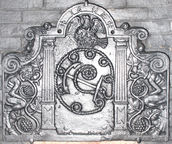-
585
Description: Central arched rectangular shape formed of fluted Ionic pilasters supporting a rounded arch, with fillet edging, bearing the date between two flower heads; beneath is a fouled anchor within a circlet of rope gathered into eight loops; a phoenix, its wings displayed and inverted, rises from the flames above the rope; mirrored outside each pilaster, a crouching, naked faun, facing inwards, disgorges a vine with bunches of grapes; above each faun a volute forms the top corner of the plate.
Notes: The decorative elements of this fireback have yet to be fully interpreted; the vines disgorged from the mouths of the fauns are related to the 'green man' tradition associated with woodland spirits and symbolising resurrection, the latter echoed by the phoenix, though in the form in which they appear on this fireback they may be a purely decorative device. By contrast, the cabled anchor is the badge of the Lord High Admiral who, in 1608, was Charles Howard, 1st Earl of Nottingham (previously Lord Howard of Effingham). A pastiche of this fireback, dated 1633, is also known (no. 1064).
Copies of this fireback are known.
Inscription: 1608
- Decoration tags:
- rectangular with canted top corners and round arch (shape)
- fillet (edging)
- whole carved pattern
- pictorial
- mythological
- text
- humans
- plants
- objects
Manufactured: in 1608 in the Weald area of England.
Current location: Petworth House, Petworth, West Sussex, England.
Museum number: NT/L/PET/M/117.1 (part of the National Trust museum group)
Citation: Lloyd, N., 1925, 'Domestic Ironwork I', Architectural Review, 58, pp. 58-67.
- Attached to series:
- Miscellaneous pattern firebacks
- Phoenix firebacks
